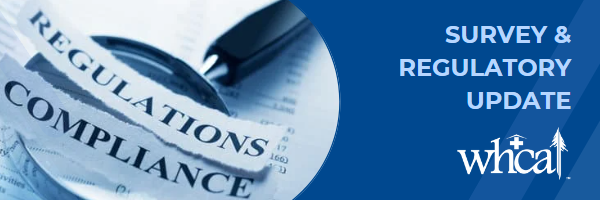Sept 29 2023 | Intermittent Nursing Services
Nurses are a relatively new addition to assisted living in Washington. In the early 2000s, it was rare to see a nurse working full-time in an assisted living facility; today, most assisted livings employ at least one nurse while many facilities employ or contract with several nurses. The roles and expectations of the nurse in assisted living have expanded over the last two decades. A nurse’s work in assisted living used to be defined as “limited” and is now referred to as “intermittent.”
Intermittent nursing services is an optional service; it is required for residents who need the service and whose services are paid for by Medicaid under the Assisted Living, Enhanced Adult Residential Care, or Enhanced Adult Residential Care – Specialized Dementia Care Medicaid contracts. The facility’s disclosure of services form addresses what intermittent nursing services are available (and the limitations of those services) to any assisted living resident needing the service.
While there is plenty of work for a nurse in an assisted living setting, WAC 388-78A-2310 highlights only six services that fall within the realm of intermittent nursing services. In reviewing these six nursing services, it seems fair to highlight that other tasks might very well be accomplished by other trained staff, such as lead caregivers or medication aides. Because of the significant shortage of nurses in Washington state and the nation at large, it is beneficial to review what services must absolutely be provided or overseen by a nurse.
Likewise, there are some nursing services that, by way of the nurse practice act, must be completed by an RN, while other nursing functions can be done by an RN or LPN. Regardless of which type of nurse (RN or LPN) conducts the nursing service, an RN must be at the helm and oversee all intermittent nursing services in assisted livings in Washington.
The six categories that fall within the definition of “intermittent nursing services” are:
- MEDICATION ADMINISTRATION. This nursing service is unique and different from medication assistance, which can be accomplished by a trained caregiver. For more information on the differences between medication assistance and administration, read the article here. The act of administering a medication can only be done by an RN, LPN, or trained and qualified caregiver via RN delegation. Some medications that require administration and cannot be completed via RN delegation include intravenous medication delivery and any injectable medication (except insulin/synthetic insulin for treatment of diabetes).
- DIABETIC MANAGEMENT. This service involves actions that a resident cannot accomplish on their own and includes blood glucose monitoring (piercing of the skin either via a typical lancet and glucometer or a wearable continuous blood glucose sensor such as Libre), insulin injections (drawing up and/or mixing insulins in an insulin syringe as well as injecting insulin into the skin), and management of an insulin pump. While some of these tasks are RN delegable, insulin pumps are not and therefore only an RN or LPN working within their scope of practice can manage insulin pumps.
- HEALTH CARE TREATMENTS. A rather nebulous term, health care treatments include but are not limited to wound care, indwelling urinary catheter changes, central line maintenance, insertion and management of a Macy Catheter, management and flushing of a Duopa pump, vagal nerve stimulation, etc. Any health care treatment that requires a sterile field cannot be accomplished via RN delegation and therefore must be done by an RN or LPN working within his/her scope of practice.
- NONROUTINE OSTOMY CARE. This includes changing the wafer around the stoma and caring for the skin beneath the wafer in a healed and stable condition. While this service is RN delegable, care of a new stoma cannot be delegated and requires nursing care by an RN or LPN working within his/her scope of practice. Simply emptying or changing the bag is considered an activity of daily living and does not require a nurse.
- TUBE FEEDING. In the event a resident cannot self-manage tube feeding, a nurse (RN or LPN) must ensure proper placement, flushing of the tube, and managing the tube feeding. All these tasks are delegable.
- NURSE DELEGATION. An RN may delegate nursing tasks to qualified, credentialed care staff when the resident agrees and is in a stable/predictable health condition. To learn more about nurse delegation, read the article here.
Anytime a resident needs any intermittent nursing service listed above, whether it is by an employed RN or LPN, a contracted RN or LPN, or via nurse delegation, the assisted living regulation and nurse practice act require an RN do the following:
- Complete and document an assessment on that specific intermittent nursing service(s).
- Develop, implement, and amend that intermittent nursing service(s) part of the resident’s negotiated service agreement.
- If RN delegation is provided to any resident, all pertinent delegation documentation must be onsite, and task sheets/directions available to care staff at all times.
There are other responsibilities that tend to fall within the role of the LPN or RN in assisted living. Preadmission assessments are commonly conducted by the LPN or RN and fall within the regulations as a role they can fulfill. Some other common tasks include medication order reviews/reconciliation, caregiver training, incident investigations, staff scheduling, resident ongoing assessments, and the development of/amendments to the negotiated service agreements. Outside of the intermittent nursing services listed in this article, many of these tasks can be trained and shared with others.
For questions regarding assisted living, please contact Vicki McNealley or call her at 1-800-562-6170 extension 107.
Posted in Assisted Living, Survey & Regulatory

